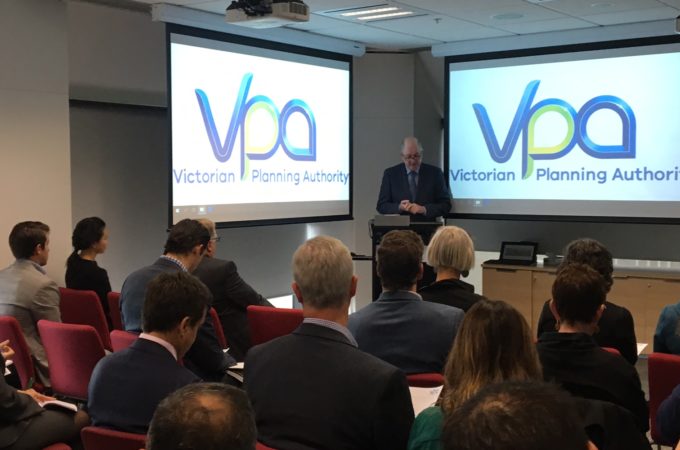
12/04/2017
Urban renewal the focus of VPA’s second Leading Practice seminar
The Victorian Planning Authority (VPA) recently hosted its second Leading Practice seminar, this time focusing on urban renewal and jobs in the suburbs.
On Friday 31 March, more than 120 people from local and state government, academia and the development industry gathered to hear from Minister for Planning, Richard Wynne, the VPA Urban Renewal team and representatives from Salta Properties, Moreland Council and Stockland.
The aim of the seminar was to alert stakeholders to the VPA’s Urban Renewal and National Employment and Innovation Cluster (NEIC) program, and how this aligns with job creation and reinvestment in Melbourne’s middle ring suburbs.
The seminar provided multiple examples of urban renewal projects, including the VPA’s Monash NEIC, Salta’s Nexus Business Park in Mulgrave, the VPA’s Arden Urban Renewal Precinct, the Coburg Initiative and Stockland’s involvement in middle-ring urban renewal precincts across Australia.
Minister Wynne introduced the seminar by reflecting on the recent launch of Plan Melbourne 2017-2050, government’s plan to manage our city’s growth. Urban renewal and jobs in the suburbs are a significant part of the plan to manage, adapt to and harness change for the social, economic and environmental benefit of future generations of Victorians.
The audience then heard from a wide range of industry representatives, who focused their presentations on the following themes:
- Housing density in middle ring suburbs
- Planning of significantly delayed sites and how to get them back on track
- Increasing job opportunities in line with Plan Melbourne 2017 – 2050 policies
- The importance of positive relationships between key stakeholders when identifying areas for redevelopment and renewal
- Market trends and emerging housing preferences
Some key VPA tenets for integrated structure planning discussed throughout the seminar include:
- Localising Activities: Minimising travel while increasing connectivity
- More economic activity and jobs in the right places
- Improving design innovation, the public domain and environmentally and socially sustainable urban areas
- Mixed use, housing diversity, employment and services
- Community Facilities, open space and recreation
- Transport and traffic, priority for walking, cycling and public transport
The seminar concluded with a brief Q&A session headed by Peter Seamer. This was Peter’s last seminar in his role as CEO of the VPA, and he took the opportunity to reiterate:
“Melbourne’s population will be doubling over the next 40 years and Collins Street won’t be getting any wider. The suburbs is where we need to be focusing future jobs growth, without detracting from the CBDs prime position. To be on top of the change we need to be planning now, thinking big and outside the square.”
Click the links below to view the presentations from the seminar:
Leading Practice – Damien Kennedy (VPA)
Leading Practice – Steve Dunn (VPA)
Leading Practice – Emily Hillebrand (VPA)
Leading Practice – Emily Mottram (VPA)
Leading Practice – Owen Smith (Salta Properties)
Leading Practice – Kristen Coster (Moreland City Council)
Leading Practice – Ben Cantwell (Stockland)
